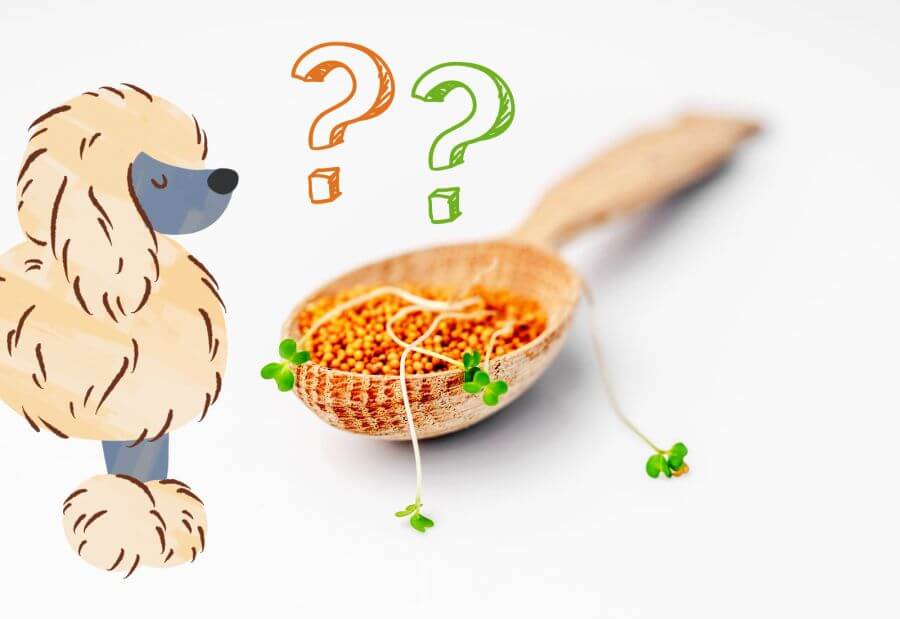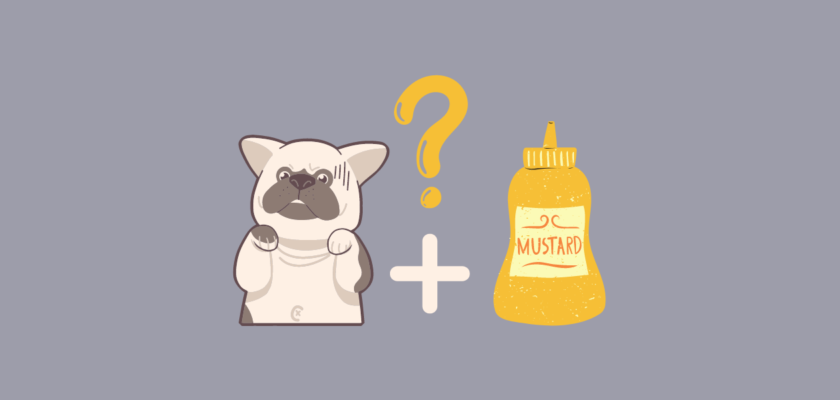Key Takeaways
- Mustard contains vitamins, minerals and antioxidants, so it’s a healthy condiment for people ✔️
- It may be toxic to dogs, however, and is best avoided in order to keep your pet safe and healthy ❌
- There are many other spices and seasonings that can be used in place of mustard in dishes for both people and dogs ✔️
- You should always consult a veterinarian before making any major dietary changes for your dog ⚠️
What Is Mustard?
Mustard is a flavorful condiment that’s made from the seeds of mustard greens, perfectly blended with some tangy lemon juice and vinegar. Spices like turmeric, paprika and garlic powder bring even more depth to this beloved accompaniment for sandwiches or hotdogs!

There are numerous types of mustards, ranging from mild to spicy. The most popular types include honey mustard, yellow mustard, dijon, whole grain, French and many more. Can dogs eat mustard? And are some types of mustard better for dogs than others? Let’s discuss it in depth.
Is Mustard Healthy or Bad for Dogs?
Mustard passes for a healthy condiment, as it’s made from several plants and contains vital minerals and antioxidants. Mustard can be rich in selenium, magnesium, calcium, potassium, vitamin A and vitamin C. Dijon mustard is also a good source of B vitamins.
The main benefit of mustard is its strong antioxidant properties. Some of the flavorful compounds in mustard – including sulforaphane – were even found to help control cancer in humans and dogs.
The condiment also consists of canola or olive oil, vinegar and spices such as turmeric and paprika. It’s low in calories and can even be used in the preparation of weight loss meals. It would seem that mustard might actually benefit canines as well as humans. But can dogs eat mustard in reality?
Can Dogs Eat Mustard, Then?
Now, let’s answer your question directly. Despite the health benefits of mustard for people, it’s toxic to dogs, and you shouldn’t give your pet any. Why would a small amount of mustard be harmful?
Mustard Seeds
Despite the common belief that a dog’s diet should not include mustard, there is no research to back this up. However, as with all things in life, it could still be something owners should take caution toward – ingesting even small amounts of mustard can lead to dire consequences for pups; from bouts of nausea & vomiting to diarrhea and beyond! Better safe than sorry may be an old adage but it won’t hurt here either.

Garlic Powder
Many mustards contain garlic powder or paste. While this is fine for people, dogs can come down with serious symptoms of poisoning. Garlic is toxic to dogs because it causes red blood cells to rupture, leading to anemia.
Horseradish
Mustard may seem like a harmless condiment to give your canine companion, but be aware that the presence of horseradish in many varieties can cause stomach upset and unpleasant side effects such as loss of appetite, vomiting and diarrhea if consumed.
Can Dogs Eat Mustard Greens?
Cooked mustard greens are safe for dogs to eat in small amounts. They contain vitamins A, C and E as well as calcium, magnesium and potassium. Don’t overfeed your dog with mustard greens, though. Just like broccoli or cabbage, too much can cause stomach upset.
There Is No Need to Give Your Dog Mustard
There are some safe alternatives for mustard that canines can benefit from. Mustard can be replaced with other types of seasonings that are safe for dogs. You can add spices like basil, turmeric or oregano to your dog’s food. In order to keep your pet healthy, you always have to take its age, breed and special needs into consideration.
As loving owners, it’s our responsibility to be aware of the potentially harmful ingredients that can lurk in everyday household items. From canned meats and sauces to salad dressings – all commonplace staples of our kitchen cabinets – many contain mustard which could spell trouble if a curious pup decides they want a taste! If your furry friend takes an impromptu snack off their plate, keep calm and watch them closely; any signs or symptoms should promptly mean contacting your veterinarian for advice. You can also follow the video below:
In conclusion, can dogs eat mustard? When it comes to dogs and mustard, erring on the side of caution is key! While many believe that its seeds can be toxic for our furry friends, other ingredients in this condiment may pose a risk as well. So if you want to keep your pup safe from harm’s way – leave mustard out of their diet.
Frequently Asked Questions
How Much Mustard Is Toxic for Dogs?
Even though a little bit of mustard may not seem like much, it can still upset your pup’s tummy. Eating too much or coming into contact with condiments containing the piquant flavor could even lead to poisoning symptoms – so watch out for vomiting and diarrhea!
Can Mustard Cause Seizures in Dogs?
Although some poisonous plants can cause seizures in dogs, it is safe to say that mustard isn’t one of them.
Similar Posts:
- Can Dogs Eat Ketchup? Is Tomato Sauce Bad for Dogs?
- Can Dogs Eat Garlic Bread? Is Garlic Safe for Dogs?
- Can Dogs Eat Pickles? The Pros and Cons of Letting Your Dog Eat Pickles
- Can Dogs Eat Jalapenos? Are Peppers Bad for Dogs?
- Can Dogs Eat Jackfruit?
- Can Dogs Eat Doritos? The Problem with Dogs Eating Chips
- Can Dogs Eat Hummus? It’s Not Just Chickpeas
- Can Dogs Eat Bell Peppers? How to Feed Your Dog Peppers Safely

